新概念英语第一册91 92课 完整ppt
合集下载
新概念英语第一册第91-92课课件
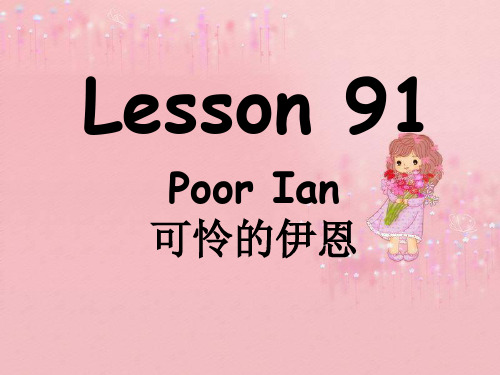
willeveryone have • What __ __ __ ?
1.There __________ a meeting tomorrow afternoon. A. will be going to B. will going to be C. is going to be D. will go to be 2. Charlie ________ here next month. A. isn’t working B. doesn’t working C. isn’t going to working D. won’t work 3. He _____ very busy this week, he ______ free next week. A. will be; is B. is; is C. will be; will be D. is; will be 4. There ________ a dolphin show in the zoo tomorrow evening. A. was B. is going to have C. will have D. is going to be 5. –________ you ________ free tomorrow? – No. I ________ free the day after tomorrow. A. Are; going to; will B. Are; going to be; will be C. Are; going to; will be D. Are; going to be; will be 6. Mother ________ me a nice present on my next birthday. A. will gives B. will give C. gives D. give
新概念英语第一册91-92课课件
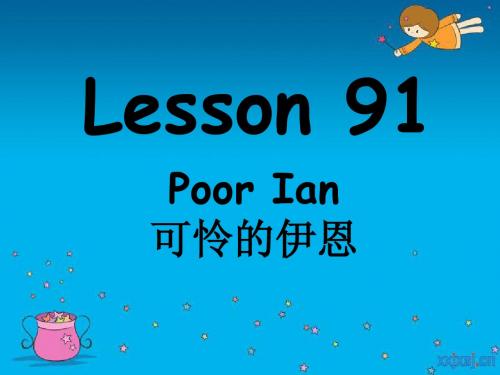
4.seat
n. 座位 have a seat =take a seat =sit down 就座 v. seat sb 使某人就座
5.play
n.戏 TV play 电视剧 v. 动词 play +球类运动 play +the +乐器 play with 玩弄
6.loudly
adv.大声地(多含喧闹之意思) loud adj./adv 响亮的/响亮地,大声的 aloud adv.出声地
7 angry
adj 生气的 angrily adv. 生气地 be angry with sb be cross with sb 和某人生气 be blue in the face 气得鼻青脸肿
8.attention
n.注意 pay attention to pay a little/ close/much/some/no attention to
You’re a student, aren’t you?
Yes, I am. No, I’m not. He didn’t go to school, did he? 他没有去上学,是吗?
You aren’t a student, are you?
Yes, I am. (不,我是一个学生。) No, I’m not. (是的,我不是学生。)
• • • • • • •
still move miss neighbour person people poor
v. 想念,思念 n. 邻居 adv. 还,仍旧 v. 搬家 n. 人 adj. 可怜的 n. 人们
1.private
adj 形容词 私人的 private coversation 私人谈话 private letter 私人信件 private car 私家车 private life 私生活 public adj. 公共的 in private=privately privacy n 隐私
新概念英语NCE_Lesson91-92(共26页)课件

Welcome back!
July27th
1.Why does Nigel believe that the house is for sale?
2.How long has Ian lived there?
3.Why does Ian want to sell the house?
4.Why couldn`t Nigel decide?
• He is sitting still. • 他一动不动地坐着。 • 病人安静地躺着。
• The patient is lying still.
• ★move v. 搬家;感动 • 这个故事感动了我。
• This story moves me. • move to 搬到……地方 • move in 搬进 • move out 搬出来 • move away 搬走 • 我们下个月将搬到乡下
lose-lost-lost meet-met-met sweep-swept-swept hear-heard-heard
Exercise:
1.Richael has already spoken to his boss.(改否定句) 2.The house cost Taylor 5000yuan.(划线提问) 3.He has had a temperature for 3hours.(划线提问) 4.The visitors came back to the airport by car.(划线 提问) 5.The boss has already left.(划线提问)
v. 退休 v. 花费
n. 英镑 prep. 值……钱 n. 便士
do-did -done go-went-gone see-saw -seen come-came-come give-gave-given rise-rose-risen speak-spoke-spoken take-took-taken eat-ate-eaten drink-drank-drunk ave you . . . yet?
July27th
1.Why does Nigel believe that the house is for sale?
2.How long has Ian lived there?
3.Why does Ian want to sell the house?
4.Why couldn`t Nigel decide?
• He is sitting still. • 他一动不动地坐着。 • 病人安静地躺着。
• The patient is lying still.
• ★move v. 搬家;感动 • 这个故事感动了我。
• This story moves me. • move to 搬到……地方 • move in 搬进 • move out 搬出来 • move away 搬走 • 我们下个月将搬到乡下
lose-lost-lost meet-met-met sweep-swept-swept hear-heard-heard
Exercise:
1.Richael has already spoken to his boss.(改否定句) 2.The house cost Taylor 5000yuan.(划线提问) 3.He has had a temperature for 3hours.(划线提问) 4.The visitors came back to the airport by car.(划线 提问) 5.The boss has already left.(划线提问)
v. 退休 v. 花费
n. 英镑 prep. 值……钱 n. 便士
do-did -done go-went-gone see-saw -seen come-came-come give-gave-given rise-rose-risen speak-spoke-spoken take-took-taken eat-ate-eaten drink-drank-drunk ave you . . . yet?
新概念英语NCE_Lesson91-92(共37页)课件

of the room. 他们把课桌移到了房间的左边。
•9、阅读使人充实,会谈使人敏捷,写作与笔记使人精确……史鉴使人明智;诗歌使人巧慧2021/9/252021/9/25Saturday, September 25, 2021 •10、每一本书是一级小阶梯,我每爬上一级,就更脱离畜生而上升到人类,更接近美好生活的观念,更热爱书籍。2021/9/252021/9/252021/9/259/25/2021 9:53:07 PM •11、书是人类进步的阶梯,终生的伴侣,最诚挚的朋友。2021/9/252021/9/252021/9/25Sep-2125-Sep-21 •12、阅读一本不适合自己阅读的书,比不阅读还要坏。我们必须会这样一种本领,选择最有价值、最适合自己所需要的读物。2021/9/252021/9/252021/9/25Saturday, September 25, 2021 13、He who seize the right moment, is the right man.谁把握机遇,谁就心想事成。2021/9/252021/9/252021/9/252021/9/259/25/2021 •14、谁要是自己还没有发展培养和教育好,他就不能发展培养和教育别人。2021年9月25日星期六2021/9/252021/9/252021/9/25 •15、一个爱书的人,他必定不致缺少一个忠实的朋友,一个良好的老师,一个可爱的伴侣,一个优婉的安慰者。2021年9月2021/9/252021/9/252021/9/259/25/2021 •16、提出一个问题往往比解决一个更重要。因为解决问题也许仅是一个数学上或实验上的技能而已,而提出新的问题,却需要有创造性的想像力,而且标志着科学的真正进步。 2021/9/252021/9/25September 25, 2021 •17、看文字须大段精彩看,耸起精神,竖起筋骨,不要困,如有刀剑在后一般。就一段中须要透;击其首则尾应,击其尾则首应,方始是。不可按册子便在,掩了册子便忘。 2021/9/252021/9/252021/9/252021/9/25
•9、阅读使人充实,会谈使人敏捷,写作与笔记使人精确……史鉴使人明智;诗歌使人巧慧2021/9/252021/9/25Saturday, September 25, 2021 •10、每一本书是一级小阶梯,我每爬上一级,就更脱离畜生而上升到人类,更接近美好生活的观念,更热爱书籍。2021/9/252021/9/252021/9/259/25/2021 9:53:07 PM •11、书是人类进步的阶梯,终生的伴侣,最诚挚的朋友。2021/9/252021/9/252021/9/25Sep-2125-Sep-21 •12、阅读一本不适合自己阅读的书,比不阅读还要坏。我们必须会这样一种本领,选择最有价值、最适合自己所需要的读物。2021/9/252021/9/252021/9/25Saturday, September 25, 2021 13、He who seize the right moment, is the right man.谁把握机遇,谁就心想事成。2021/9/252021/9/252021/9/252021/9/259/25/2021 •14、谁要是自己还没有发展培养和教育好,他就不能发展培养和教育别人。2021年9月25日星期六2021/9/252021/9/252021/9/25 •15、一个爱书的人,他必定不致缺少一个忠实的朋友,一个良好的老师,一个可爱的伴侣,一个优婉的安慰者。2021年9月2021/9/252021/9/252021/9/259/25/2021 •16、提出一个问题往往比解决一个更重要。因为解决问题也许仅是一个数学上或实验上的技能而已,而提出新的问题,却需要有创造性的想像力,而且标志着科学的真正进步。 2021/9/252021/9/25September 25, 2021 •17、看文字须大段精彩看,耸起精神,竖起筋骨,不要困,如有刀剑在后一般。就一段中须要透;击其首则尾应,击其尾则首应,方始是。不可按册子便在,掩了册子便忘。 2021/9/252021/9/252021/9/252021/9/25
新概念第一册L91-92课ppt课件

他是个好人。
in person 亲自,直接的 Eg: He gets the money in person.
他亲自去取钱。
personal adj. 个人的,私人的 Eg:a personal letter
★ people
n. ①人们 Eg:There are a lot of people in the street. 街上有很多人。
一般将来时练习题
( ) 1. There ____C______ a meeting tomorrow afternoon.
A. will be going to
B. will going to be
C. is going to be
D. will go to be
( ) 2. Charlie ___D_____ here next month.
house yet?
副词still也可用于一般现在时, 注意位置在be动词之后。
JENNY: No, not yet. He’s still here.
He’s going to move tommorrow.
最新编辑ppt
24
CATHERINE: When? Tomorrow morning?
JENNY: No. Tomorrow afternoon.
• A.don't feel B.hasn't felt
• C.haven't felt D.didn't feel
最新编辑ppt
7
• Mr smith _______to Tokyo and he will be back in a week
• A.has been B.has visited • C.has sent D.has gone
in person 亲自,直接的 Eg: He gets the money in person.
他亲自去取钱。
personal adj. 个人的,私人的 Eg:a personal letter
★ people
n. ①人们 Eg:There are a lot of people in the street. 街上有很多人。
一般将来时练习题
( ) 1. There ____C______ a meeting tomorrow afternoon.
A. will be going to
B. will going to be
C. is going to be
D. will go to be
( ) 2. Charlie ___D_____ here next month.
house yet?
副词still也可用于一般现在时, 注意位置在be动词之后。
JENNY: No, not yet. He’s still here.
He’s going to move tommorrow.
最新编辑ppt
24
CATHERINE: When? Tomorrow morning?
JENNY: No. Tomorrow afternoon.
• A.don't feel B.hasn't felt
• C.haven't felt D.didn't feel
最新编辑ppt
7
• Mr smith _______to Tokyo and he will be back in a week
• A.has been B.has visited • C.has sent D.has gone
新概念英语第一册第91-92课ppt课件
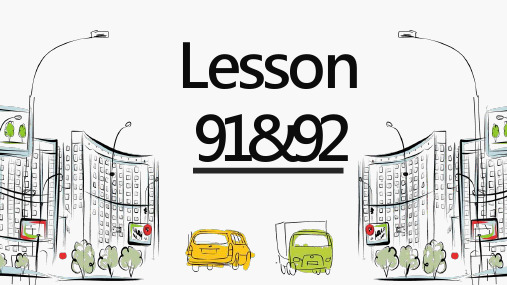
This story moved me.
6
★neighbour
n. 邻居
neighbourhood
n.四邻,邻近地区
这一带很安静。
This is a quiet neighbourhood.
他要搬到这一带。
He is moving into the neighbourhood.
in the neighbourhood of
10
rain snow leave get up arrive finish work have a holiday drive home
have a haircut telephone me have a shave pack his bags sweep the floor paint this room repair my car
He’s still here.
将来时的时间状语
He’s going to move tomorrow.
be going to 打算做某事
25
将来时的时间状语
CATHERING: When? Tomorrow morning?
JENNY:
No. Tomorrow afternoon.
I'll miss him. 思念,想念 错过
make an appointment
11
02
Practice
12
• still • move • miss • neighbour • person • people • poor
v. 想念,思念 n. 邻居 adv. 还,仍旧 v. 搬家 n. 人 adj. 可怜的 n. 人们
13
03
Game Time
6
★neighbour
n. 邻居
neighbourhood
n.四邻,邻近地区
这一带很安静。
This is a quiet neighbourhood.
他要搬到这一带。
He is moving into the neighbourhood.
in the neighbourhood of
10
rain snow leave get up arrive finish work have a holiday drive home
have a haircut telephone me have a shave pack his bags sweep the floor paint this room repair my car
He’s still here.
将来时的时间状语
He’s going to move tomorrow.
be going to 打算做某事
25
将来时的时间状语
CATHERING: When? Tomorrow morning?
JENNY:
No. Tomorrow afternoon.
I'll miss him. 思念,想念 错过
make an appointment
11
02
Practice
12
• still • move • miss • neighbour • person • people • poor
v. 想念,思念 n. 邻居 adv. 还,仍旧 v. 搬家 n. 人 adj. 可怜的 n. 人们
13
03
Game Time
新概念英语第一册91-92课-完整ppt

He is a nice/good person. • 他是个好人。 • in person • 亲自,直接的 • He will go to get the money in person. • 他将亲自去取钱。 • personal • adj. 个人的,私人的 • a personal letter
OK,has Ian sold his house?Maybe yes,maybe no,has he moved to a new house? Now let`s listen to the audio and see if you can answer the question"Who wanted to sell the house?"
Lesson 91Poo源自 Ian本课内容• 单词学习 • 课文讲解 • 练习 • 日常用语 • 作业
Episode
If your father wants to go to the cinema,your mother wants to go shopping,what will they do?
• ★person n.(强调个体,不分男女老少,有复数persons) • The person in a hat is my father.
• ★people n.(强调集体,是集合名词) • How many people are there in your family? • person • n. 人
• He is sitting still. • 他一动不动地坐着。 • 病人安静地躺着。
• The patient is lying still.
• ★move v. 搬家;感动 • 这个故事感动了我。
• This story moves me. • move to 搬到……地方 • move in 搬进 • move out 搬出来 • move away 搬走 • 我们下个月将搬到乡下
OK,has Ian sold his house?Maybe yes,maybe no,has he moved to a new house? Now let`s listen to the audio and see if you can answer the question"Who wanted to sell the house?"
Lesson 91Poo源自 Ian本课内容• 单词学习 • 课文讲解 • 练习 • 日常用语 • 作业
Episode
If your father wants to go to the cinema,your mother wants to go shopping,what will they do?
• ★person n.(强调个体,不分男女老少,有复数persons) • The person in a hat is my father.
• ★people n.(强调集体,是集合名词) • How many people are there in your family? • person • n. 人
• He is sitting still. • 他一动不动地坐着。 • 病人安静地躺着。
• The patient is lying still.
• ★move v. 搬家;感动 • 这个故事感动了我。
• This story moves me. • move to 搬到……地方 • move in 搬进 • move out 搬出来 • move away 搬走 • 我们下个月将搬到乡下
新概念英语第一册91-92课课件
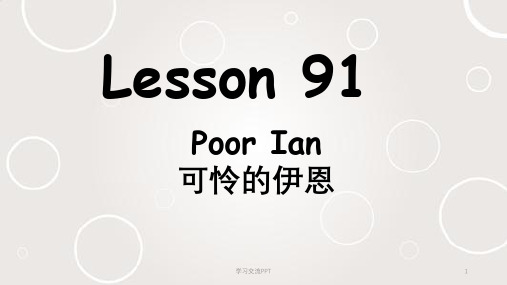
To practice English speaking, one has to speak aloud. 为了练英语说话,一个人必须大声朗读。
学习交流PPT
14
7 angry
adj 生气的 angrily adv. 生气地 be angry with sb be cross with sb 和某人生气
7
• still • move • miss • neighbour • person • people • poor
v. 想念,思念 n. 邻居 adv. 还,仍旧 v. 搬家 n. 人 adj. 可怜的 n. 人们
学习交流PPT
8
1.private
adj 形容词 私人的
private coversation
• She looked very ill last week and this week looks still worse.
她上周看起来病得很严重,这周更严重了。
③ adv. 静止地;安静地
• He is sitting still.
• 他一动不动地坐着。
学习交流PPT
2
• The patient is lying still.
① v. 想念,惦念
• I missed you.
• 我想你
② v. 错过;未做到
• He missed the bus and walked home.
• 他没有赶上公共汽车就走回家了。
• miss doing sth.
未能
I missed buying the magazine.
我未能买到那本杂志。
学习交流PPT
4
person
n. 人 He is a nice/good person. 他是个好人。
学习交流PPT
14
7 angry
adj 生气的 angrily adv. 生气地 be angry with sb be cross with sb 和某人生气
7
• still • move • miss • neighbour • person • people • poor
v. 想念,思念 n. 邻居 adv. 还,仍旧 v. 搬家 n. 人 adj. 可怜的 n. 人们
学习交流PPT
8
1.private
adj 形容词 私人的
private coversation
• She looked very ill last week and this week looks still worse.
她上周看起来病得很严重,这周更严重了。
③ adv. 静止地;安静地
• He is sitting still.
• 他一动不动地坐着。
学习交流PPT
2
• The patient is lying still.
① v. 想念,惦念
• I missed you.
• 我想你
② v. 错过;未做到
• He missed the bus and walked home.
• 他没有赶上公共汽车就走回家了。
• miss doing sth.
未能
I missed buying the magazine.
我未能买到那本杂志。
学习交流PPT
4
person
n. 人 He is a nice/good person. 他是个好人。
新概念英语第一册91-92课课件

When will you go to American?
When will Jack go to American?
第二十一页,共31页。
CATHERINE:Has Ian sold his house yet?
JENNY
:Yes, he has. He sold it last week.
CATHERINE:Has he moved to his new
He will go to get the money in person.
他将亲自去取钱。
personal
adj. 个人的,私人的
a personal letter
person 强调的个体的人,可以有复数形式 persons
people 通常是人的统称,单复数形式相同
第五页,共31页。
★miss
新概念英语第一册91-92课课件
第一页,共31页。
★still
① adv. 还是,仍然
• I still can’t decide where to go.
• 我还是不能决定去哪。
• She was still beautiful at the age of 46.
• 她46岁时仍然美丽。
② adv. 还要,甚至更 • She looked very ill last week and this week looks still
have a seat
=take a seat
=sit down
就座 v.
seat sb
使某人就座
第十二页,共31页。
5.play
n.戏
TV play 电视剧
v. 动词 play +球类运动 play +the +乐器
When will Jack go to American?
第二十一页,共31页。
CATHERINE:Has Ian sold his house yet?
JENNY
:Yes, he has. He sold it last week.
CATHERINE:Has he moved to his new
He will go to get the money in person.
他将亲自去取钱。
personal
adj. 个人的,私人的
a personal letter
person 强调的个体的人,可以有复数形式 persons
people 通常是人的统称,单复数形式相同
第五页,共31页。
★miss
新概念英语第一册91-92课课件
第一页,共31页。
★still
① adv. 还是,仍然
• I still can’t decide where to go.
• 我还是不能决定去哪。
• She was still beautiful at the age of 46.
• 她46岁时仍然美丽。
② adv. 还要,甚至更 • She looked very ill last week and this week looks still
have a seat
=take a seat
=sit down
就座 v.
seat sb
使某人就座
第十二页,共31页。
5.play
n.戏
TV play 电视剧
v. 动词 play +球类运动 play +the +乐器
新概念英语第一册lesson91-92课件

★miss v. 想念,思念 ① v. 想念,惦念 • I miss you. ② v. 错过 他起晚了,错过了那班火车。 • He got up late and missed that train.
• • • •
★ person n.人 (强调个体,不分男女老少,有复数persons) The person in a hat is my father. He is a nicБайду номын сангаас/good person.他是个好人。
• He is going to paint this bookcase tomorrow. • I am going to spend the holiday next week. • They are going to buy some fruit this evening. be going to do 计划/打算做某事,表将来 • • • • He will go to America tomorrow. I will buy a car next year. They will have a party tomorrow evening. will do 将要……,表将来
you see Ian today, Jenny? Jenny: Yes, I will. Linda:Please give him my regards. Catherine: Poor Ian! He didn't want to leave this house. Jenny: No, he didn't want to leave, but his wife did.
一般将来时
表示将来将要发生的动作或事情 be going to do 计划/打算做……
新概念第一册英语Lesson91-Lesson92课件
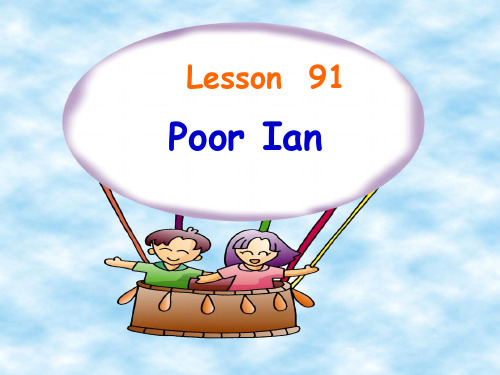
二、句型转换
• 1. I will go to Beijing tomorrow.(同义句) • 2.He will leave next month. (同义句) • A: He _____ ______ ______ leave next month. • B: He ______ ________ next month. • 3. We will have our lunch together. (一般疑问句) • 4.They will move to their new house next month. • (否定句)
at 12:00.
一般将来时的构成(二)
• 肯定句:主语+will+动词原形 • will为助动词,与情态动词用法相同,与动
词原形构成谓语,不需要根据人称进行变 化。 • 缩写:I will=I’ll • she will = she’ll • he will=he'll • they will= they’ll
Lesson 91
Poor Ian
★move
• 1. v. 搬家 • 短语: • move to/into +地点 搬到……地方 • move in 搬进(后面不能接宾语)
• 2.感动 • This story moves me.
★miss
① v. 想念,惦念 miss+人 想念某人 I miss my grandmother very much.
三、时态综合练习 --- 用所给词的适当形式填空
• 1.My father (go) back next Sunday. Then he can take me to the Great Wall.
• 2.Peter (go) back home at seven this evening.
新概念英语第一册91-92课课件

• move from…to…
• 从…搬到…
• They moved from Nanjing to Shenzhen.
• 他们从南京搬到深圳。
• ②感动,打动 • This story moved me. • 这个故事感动了我。
第五页,共48页。
neighbour
n. 邻居
neighbourhood n.四邻,邻近地区 This is a quiet neighbourhood. 这一带很安静。 He is moving into the neighbourhood.
第十三页,共48页。
一般将来时
What will… When will… What will you do tomorrow?
When will you leave? 你后天打算去学校干嘛啊?
你什么时候出发?
注意在翻译时要与表示将来的时间状语连用。
第十四页,共48页。
一般将来时与be+going to的区别
• The patient is lying still. • 病人安静地躺着。
第四页,共48页。
• ★move
• v. ①搬家;移动
• move in
• 搬进(强调状态,结果)
• move into
• 搬进来(强调动作,过程)
• move out (of)
• 搬出来 • move away
• 搬走
• 一般将来时表示将来某一时刻的动作或状态,或将来
某一段时间内经常的动作或状态。常常和表示将来的 时间状语连用。 • I will do my homework this evening.
• Be+going to表示将来某时进行的状态或动作,或按预
• 从…搬到…
• They moved from Nanjing to Shenzhen.
• 他们从南京搬到深圳。
• ②感动,打动 • This story moved me. • 这个故事感动了我。
第五页,共48页。
neighbour
n. 邻居
neighbourhood n.四邻,邻近地区 This is a quiet neighbourhood. 这一带很安静。 He is moving into the neighbourhood.
第十三页,共48页。
一般将来时
What will… When will… What will you do tomorrow?
When will you leave? 你后天打算去学校干嘛啊?
你什么时候出发?
注意在翻译时要与表示将来的时间状语连用。
第十四页,共48页。
一般将来时与be+going to的区别
• The patient is lying still. • 病人安静地躺着。
第四页,共48页。
• ★move
• v. ①搬家;移动
• move in
• 搬进(强调状态,结果)
• move into
• 搬进来(强调动作,过程)
• move out (of)
• 搬出来 • move away
• 搬走
• 一般将来时表示将来某一时刻的动作或状态,或将来
某一段时间内经常的动作或状态。常常和表示将来的 时间状语连用。 • I will do my homework this evening.
• Be+going to表示将来某时进行的状态或动作,或按预
新概念第一册Lesson_91-92ppt课件

那个可怜的老妇人找不到人和他说话。 2)贫穷的, ↔ rich eg. We must help the poor people.
我们要帮助穷人。
最新版整理ppt
15
Poor Ian.mp3
第一遍 听文章大意~ 第二遍 听力填空~
最新版整理ppt
16
Lesson91— —92.flv
最新版整理ppt
•:
• 坚持记单词,完成作业。你可以在接触一篇新的课文前,先 不要看它的英文,而是根据它的中文翻译自己写再翻译成英 语,然后再和原文对照,这样一经对比,就可以找到自己写 作的弱点和问题,及时修正,日久积累,从而获得提高。。
最新版整理ppt
5
If you persist, you will become a superman
1 Has Ian sold his house yet?
Yes, he has. He sold it last week.
2 Has he moved to his new house yet?
No, he hasn't.
3 When is he going to move?
He is going to move tomorrow. afternoon.
of the room. 他们把课桌移到了房间的左边。
最新版整理ppt
11
miss v. 想念,思念
1)想念,思念
eg. We will miss you if you move.
如果你搬家了,我们会想你的。
I really miss my hometown.
我真的很想念我的家乡。
2)错过
We missed the bus.
我们要帮助穷人。
最新版整理ppt
15
Poor Ian.mp3
第一遍 听文章大意~ 第二遍 听力填空~
最新版整理ppt
16
Lesson91— —92.flv
最新版整理ppt
•:
• 坚持记单词,完成作业。你可以在接触一篇新的课文前,先 不要看它的英文,而是根据它的中文翻译自己写再翻译成英 语,然后再和原文对照,这样一经对比,就可以找到自己写 作的弱点和问题,及时修正,日久积累,从而获得提高。。
最新版整理ppt
5
If you persist, you will become a superman
1 Has Ian sold his house yet?
Yes, he has. He sold it last week.
2 Has he moved to his new house yet?
No, he hasn't.
3 When is he going to move?
He is going to move tomorrow. afternoon.
of the room. 他们把课桌移到了房间的左边。
最新版整理ppt
11
miss v. 想念,思念
1)想念,思念
eg. We will miss you if you move.
如果你搬家了,我们会想你的。
I really miss my hometown.
我真的很想念我的家乡。
2)错过
We missed the bus.
新概念第一册L91-92课ppt课件

最新编辑ppt
8
• We haven't seen the film_______. • A. already B. ever C. yet D. since
最新编辑ppt
9
• Mary isn't here. She has ____ the shop. • A. been to B. went to C. gone to D. /
他是个好人。
in person 亲自,直接的 Eg: He gets the money in person.
他亲自去取钱。
personal adj. 个人的,私人的 Eg:a personal letter
★ people
n. ①人们 Eg:There are a lot of people in the street. 街上有很多人。
• A.don't feel B.hasn't felt
• C.haven't felt D.didn't feel
最新编辑ppt
7
• Mr smith _______to Tokyo and he will be back in a week
• A.has been B.has visited • C.has sent D.has gone
最新编辑ppt
10
Lesson 91 Poor Ian
Move
最新编辑ppt
12
Neighbor
最新编辑ppt
13
• Still /stɪl/还,仍旧 • Move /mu:v/搬家 • Miss /mɪs/想念,思念 • Neighbor /'neɪbə/邻居 • Person /ˈpɜ:sn/人 • People /ˈpi:pl/人们 • Poor /puə/可怜的
新概念英语NCE_Lesson91-92(共18页)课件

★move v. 搬家;感动
The story moves me. move to 搬到……地方 move in 搬进 move out 搬出来 move away 搬走 move into 搬进(由外到内的过程)
★miss v. 想念,思念 ① v. 想念,惦念 ② v. 错过;未做到 He overslept and missed his train. 他 睡过了头,错过了他那班火车。
I missed an opportunity of realizing my
dream. 我错过了一个可能实现自己梦想的机会。
•9、阅读使人充实,会谈使人敏捷,写作与笔记使人精确……史鉴使人明智;诗歌使人巧慧2021/9/252021/9/25Saturday, September 25, 2021 •10、每一本书是一级小阶梯,我每爬上一级,就更脱离畜生而上升到人类,更接近美好生活的观念,更热爱书籍。2021/9/252021/9/252021/9/259/25/2021 9:51:15 PM •11、书是人类进步的阶梯,终生的伴侣,最诚挚的朋友。2021/9/252021/9/252021/9/25Sep-2125-Sep-21 •12、阅读一本不适合自己阅读的书,比不阅读还要坏。们必须会这样一种本领,选择最有价值、最适合自己所需要的读物。2021/9/252021/9/252021/9/25Saturday, September 25, 2021 13、He who seize the right moment, is the right man.谁把握机遇,谁就心想事成。2021/9/252021/9/252021/9/252021/9/259/25/2021 •14、谁要是自己还没有发展培养和教育好,他就不能发展培养和教育别人。2021年9月25日星期六2021/9/252021/9/252021/9/25 •15、一个爱书的人,他必定不致缺少一个忠实的朋友,一个良好的老师,一个可爱的伴侣,一个优婉的安慰者。2021年9月2021/9/252021/9/252021/9/259/25/2021 •16、提出一个问题往往比解决一个更重要。因为解决问题也许仅是一个数学上或实验上的技能而已,而提出新的问题,却需要有创造性的想像力,而且标志着科学的真正进步。 2021/9/252021/9/25September 25, 2021 •17、看文字须大段精彩看,耸起精神,竖起筋骨,不要困,如有刀剑在后一般。就一段中须要透;击其首则尾应,击其尾则首应,方始是。不可按册子便在,掩了册子便忘。 2021/9/252021/9/252021/9/252021/9/25
- 1、下载文档前请自行甄别文档内容的完整性,平台不提供额外的编辑、内容补充、找答案等附加服务。
- 2、"仅部分预览"的文档,不可在线预览部分如存在完整性等问题,可反馈申请退款(可完整预览的文档不适用该条件!)。
- 3、如文档侵犯您的权益,请联系客服反馈,我们会尽快为您处理(人工客服工作时间:9:00-18:30)。
Hale Waihona Puke eviewbelieve may how long since why sell because retire cost pound worth penny
v. 相信,认为 可以
多长
prep. 自从 adv. 为什么 v. 卖,出售 conj. 因为 v. 退休 v. 花费 n. 英镑 prep. 值……钱
all
miss
him.
CATHERINE:When will the new people move into
this
house?
JENNY:I think that they'll move in the day after tomorrow.
LINDA : Will you see Ian today, Jenny?
Welcome back!
1.Why does Nigel believe that the house is for sale? 2.How long has Ian lived there? 3.Why does Ian want to sell the house? 4.Why couldn`t Nigel decide? 5.Who has the last word in your family?
Q&A
5.Is Ian a good neighbor ? 6.Will Jenny see Ian today ? 7. Did Ian want to leave this house ? 8. Who wanted to sell this house ? 9.Will Jenny and Catherine miss Ian ?
• move to = move into 搬进。 • people = neighbours • 她是这个职位的合适人选。 • She’s the right person for this job. • 公园里有很多人。 • There’re a lot of people in the park.
• poor
• adj. ①可怜的 • The poor old woman had no one to talk to. • 那个可怜的老人找不到人跟她说话。 • ②贫穷的 • a poor man • 贫穷的人 富裕的人 • the poor the rich • 穷人 • We should help the poor. • ③笨拙的,差劲的 • be good at sth./be good at doing sth. • be poor at sth./ be poor at doing sth. • 擅长于/不擅于…
• How many people are there in your family? • person • n. 人
He is a nice/good person. • 他是个好人。 • in person • 亲自,直接的 • He will go to get the money in person. • 他将亲自去取钱。 • personal • adj. 个人的,私人的 • a personal letter
JENNY
:
Yes,
I
will.
CATHERINE:Poor Ian! He didn't want to leave this house
JENNY
:No, he didn't want to leave,
but
his
wife
did!
课• -y文He讲at?解s he moved to his new house
neighbour. • 现在完成时 • 指Ian自从在这住开始到现在一直都很
好
• He’s a very nice person. • 表达人的人品很好可以用good或nice。 • person 强调的个体的人,可以有复数
形式persons • people 通常是人的统称,单复数形式
• When will the new people move into this house?
• -No, not yet. • Move to 搬到… • 我明天要搬到B区的办公室。
• I’ll move to the office in zone B tomorrow.
• Yet用于疑问句和否定句的句尾。
• No, he has not moved to his new house yet.
lose-lost-lost meet-met-met sweep-swept-swept hear-heard-heard
Exercise:
1.Richael has already spoken to his boss.(改否定句) 2.The house cost Taylor 5000yuan.(划线提问) 3.He has had a temperature for 3hours.(划线提问) 4.The visitors came back to the airport by car.(划线提问) 5.The boss has already left.(划线提问)
1.Has Ian sold his house yet ? 2.When did Ian sell his house ? 3.Has Ian moved to his new house yet ? •2020/4/246.When will he move to his new house ?
• Please give him my regards. • give sb. sth. = give sth. to sb. 给某
人某物=把某物给某人 • 请代我们问候你的父母
• Please give your parents our regards.
• Please give our regards to your parents.
• Poor Ian! 同情某人时的常用语。
• -He didn’t want to leave this house. • -No, he didn’t, but his wife did! • 反意疑问句: • -He didn’t go to school yesterday, did he? • -No, he didn’t.(是的,他没去。) • Yes, he did.(不,他去了。) • 注意没有混搭形式:Yes, he didn’t. / No, he did.
② adv. 还要,甚至更 • 她上周看起来病得很严重,这周更严重了。 • She looked very ill last week and this week looks still worse.
③ adv. 静止地;安静地 • He is sitting still. • 他一动不动地坐着。 • 病人安静地躺着。 • The patient is lying still.
•2020/4/26
• n. 邻居 • neighbourhood • n.四邻,邻近地区 • This is a quiet neighbourhood. • 这一带很安静。 • He is moving into the neighbourhood. • 他要搬到这一带。 • in the neighbourhood of 在…附近
OK,has Ian sold his house?Maybe yes,maybe no,has he moved to a new house?
Now let`s listen to the audio and see if you can answer the question"Who wanted to sell the house?"
• 副词still也可用于一般现在时,注意位 置在be动词之后。
• He’s going to move tomorrow. • be going to do 计划、打算做某事。 • I’ll miss him. = I will miss him • I miss home very much. • He missed the train yesterday. • I miss you because I missed you.
单词学习
• still • move • miss • neighbour • person • people • poor
adv. 还,仍旧 v. 搬家 v. 想念,思念
n. 邻居 n. 人 n. 人们 adj. 可怜的
★still adv. 还,仍旧 ① adv. 还是,仍然
• 我仍然不知道他是什么意思。 • I still don’t understand what he meant.
CATHERINE : When? Tomorrow morning?
JENNY
:No. Tomorrow afternoon. I'll miss him. He has always been a good neighbour.
LINDA:He's a very nice person.
We'll
反义疑问句
You’re a student, aren’t you? Yes, I am. No, I’m not. You aren’t a student, are you? Yes, I am. (不,我是一个学生。) No, I’m not. (是的,我不是学生。) •2020/4/26
He didn’t go to school, did he? 他没有去上学,是吗? No, he didn’t. 是的, 他没去。 Yes, he did. 不,他去了。
•2020/4/26
